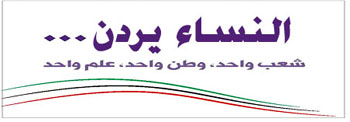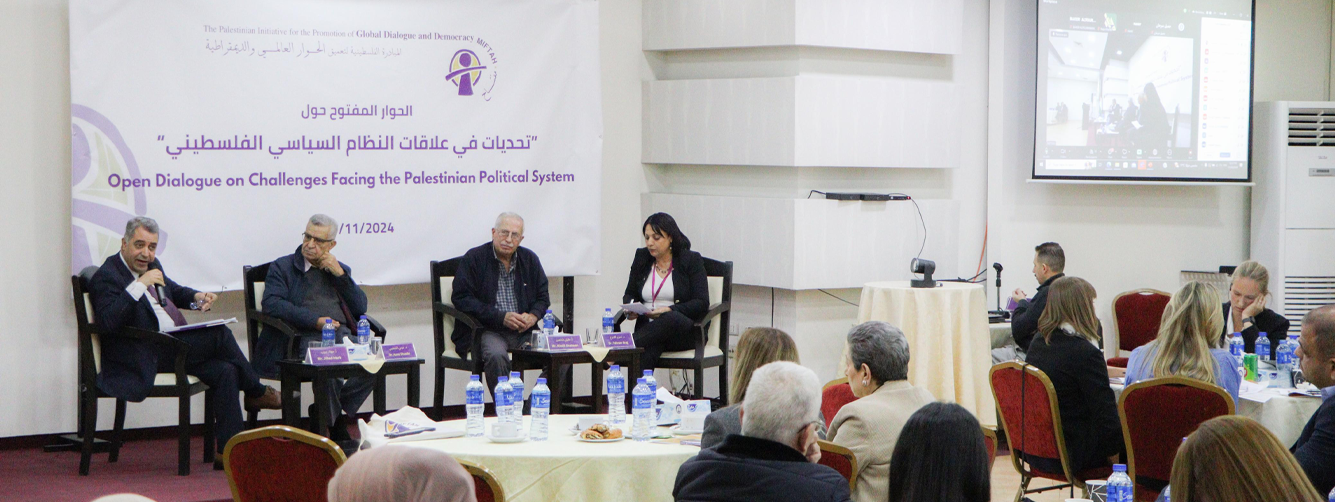
Recently, MIFTAH capped off a series of radio talk shows on Radio 24FM with several political, youth and media leaders along with officials from civil society organizations and women leaders from the various Palestinian factions and organizations. The discussions focused on the Palestinian division and efforts being made to achieve national reconciliation. This was one of the activities from the “Women’s Call...one people, one homeland, one flag” conference MIFTAH organized in June 2015.
Social contract…a pressing need
The speakers confirmed that the basis of the social contract demanded by the women’s movement revolves around equality, respect for pluralism and lack of discrimination. It is based on the concept of citizenship, which prevents any kind of exclusion and is consistent with the Basic Law and the Palestinian declaration of independence. It is also in line with binding international conventions and agreements. The speakers maintained that reaching this social contract would be possible through a national salvation- conference that would determine the perimeters of a progressive political system which would in turn determine the shape of Palestinians’ future. It would entail justice and equality between men and women based on international conventions and agreements, which were signed at the start of 2014, especially those pertaining to women. This requires a political will that will push for democratic legislation in women’s favor and for developing a system capable of rescuing them through a monitoring and accountability process, based on the premise that abiding by the law is the basis of the social contract and breaking these laws is one of the most significant factors that contribute to division and disunity.
Youth and women leaderships
There is a need for evaluation of the current situation regarding the political participation of youth and women and a need to integrate youth and women leaders in a clear, conscious and responsible way. As long as women are outside the framework of authority, no system of government will be able to continue because it loses its representative capacity. The exclusion of women from political participation, especially at this stage for the Palestinian people, and their lack of representation in social and political frameworks, is an abandonment of women’s capabilities, visions and competencies, which are the very things that can address the core of social and political problems which produced in the division in the first place.
The speakers also reaffirmed the need to integrate women in national reconciliation committees. This is especially pressing since it is women who are paying the highest price for the division and lack of national reconciliation. Her presence and representation of the entire Palestinian spectrum will put things back in context because it is women who are capable of setting priorities and focusing on issues relevant to public interest and which benefit society as a whole rather than factional or party interests. These, on the other hand, exclude the other and close the door to dialogue between the different components of society.
Agreements and understandings to end the division
The speakers all agreed on the need to abide by the Cairo and Shati’ Agreements and the Prisoners’ Document and to reject all bilateral agreements between Fatah and Hamas. They called on the two rivals to halt mutual accusations and media slander between them.
Women’s Role
They also reaffirmed that women have suffered the most damage from the division, therefore calling on them to be at the forefront of efforts to end it. They noted that women carried out a number of activities in this regard through the General Union of Palestinian Women and other women’s parties inside the homeland and abroad and that a variety of tools and mechanisms were needed to press for ending the division, the only beneficiary of which is the occupation.
In this context, the speakers called for the formation of women’s and popular committees, for a united women’s voice and a revival of the General Union and women’s parties towards promoting social and political reconciliation.
Regional interferences and external pressures
The talk show guests pointed to regional interferences, saying they were hindrances to the reconciliation. They continued that achieving reconciliation required national and political will and a refusal to kowtow to regional agendas. Reconciliation and ending the division, they maintained, was a crucial national issue for all Palestinians and not just for Fatah and Hamas.
Popular action
They also agreed that popular pressure on the two rival parties was an important means of achieving reconciliation and prompting them to end the division. It should be noted that MIFTAH’s “Women’ Call” conference confirmed that women are capable of achieving national unity by creating a unifying general vision for Palestinians to adopt a clear strategy, which would be the reference for any future action in this respect. This requires from the GUPW to formulate a national plan that would enable women to participate in reconciliation committees through exerting pressure within their own political parties and forming a national leadership for all national and Islamic parties in addition to forming popular committees to exert pressure on the two sides.
The role of youth
The speakers noted that the division has generated frustration and a lack of trust among wide sectors of youth in factions and parties, who have criticized the fact that the dialogue has been confined to the Palestinian leadership and has not involved all sectors of society to work towards producing a new political system that expresses the hopes of the people and the aspirations and needs of youth.
The youth also rejected the dichotomy of the two sides of the division; they maintained that their activities are mostly far removed from political parties, but within civil society organizations, which give them the space and freedom to express their opinions; they could be dismissed from their parties, they said, under the pretext of not abiding by their bylaws.
They called for a new legal system that entails the freedom of expression and gathering and which allows youths to assume the roles they want, criticizing the oppression of youth initiatives in the Gaza Strip.
Youth networks
Meanwhile, the speakers pointed out that the currently active youth networks are independent ones, even though many of their members are affiliated with their parties and factions. However, they all agree on a unified vision towards national issues and priorities, far removed from their parties.
The speakers pointed out that the division prevents the convention of internal conferences for factions and parties. Furthermore, decision-makers staying in their positons for so long has created mutual interests between these leaders and has prevented youth involvement. Youths found their place through youth networks instead and consider social reconciliation one of society’s biggest concerns and the safety valve for avoiding a return to infighting; they stress on the need for spreading awareness and implementing interim justice far from tribal solutions to achieve social reconciliation. These networks stress on youths playing their role in promoting the value of discussion and the acceptance of the other, spreading the politics of tolerance and social justice and offering attention to certain schools and mosques, which encourage the culture of division.
The speakers called on the youth from the two rival parties to form unified student councils inside universities and to conduct the election process with transparency even though the mechanisms for popular and factional accountability are obsolete. They stressed on the shortcomings of the Basic Law in that it does not grant youths their rights in political participation. This is in addition to the police and security mentality in dealing with youth and popular movements.
Pressure groups
The speakers also called for the formation of pressure groups against the division and for involving youths in political and social reconciliation committees. They called for establishing a monitoring body and allowing for activities inside universities and schools, in addition to forming a youth shadow government that monitors the performance of the reconciliation committees.
They also spoke about the need for studies in order to transform youth initiatives into social actions capable of making the required change, reaffirming that youths play a pioneer role and are active in realms such as youth movements and civil society organizations where youths could play a prominent role in forming a third approach. An example of this would be the youth movement within the boycott campaign and the right of return committees. All of these bodies work outside of the conventional political system and national movement and are not claimed by the PLO or the factions. However, they are haphazard and need coordination and a vision, which could transform them into a third national, democratic movement.
The media and the division
The speakers maintained that the local media has dealt with and continues to deal with the division superficially and has not played its role in accountability and monitoring. This also applies to the status of women journalists. That is, the media has not been a beacon for women harmed by the division and has not impacted the various levels of political decisions. Instead, women continue to be marginalized by political leaderships.
The speakers said the media and journalist who contributed to inciting and encouraging violence and the spread of hatred must be held accountable and the media made to adhere to professionalism, neutrality and objectivity. They also need to be encouraged to develop their media rhetoric and conduct investigative reports on the impact of the division. Another subject they need to cover is the situation of women, far removed from political leaders and the damages from the division. The media, they said, must play a positive role in social reconciliation and push towards women’s participation and active roles in reconciliation committees.
The role of civil society organizations
In this regard, the speakers stressed on the variety and contrast of civil society organizations, saying they were an integral part of the crisis especially in regards to their political programs. They said that while there were efforts made by some civil society institutions, their work remained elitist and ineffective at the community level. The overwhelming majority of these institutions have no specific programs for national reconciliation, they said. What’s more, they only give attention to this subject seasonally, considering that the achievement of national reconciliation is not a ‘right” of the Palestinian people. This is over and above the fact that civil society institutions do not have a clear strategy or vision towards ending the division and achieving national reconciliation in addition to lacking any popular efforts from all sectors of society.
The speakers pointed out that the key element to achieving reconciliation is missing, which is the need agree on a conciliatory political program. Without this, no national unity government can sustain. At the same time, the qualities of the current Palestinian political system must not be overlooked; that is, the impact tools in this system are missing; the PLC is defunct and there is no accountability or monitoring, which means other realms must be sought out for this, such as civil society organizations.
Absenting women from reconciliation committees
The speakers warned that absenting the participation of women from the six reconciliation committees and failing to recognize the powerful role they could play is a waste of Palestinian female energy. Palestinian women are educated and public figures who are part of political parties and the PLC. These women should have played a stronger role with the two rival parties in order to end the division. They called for pressuring for this with party and faction leaders. They stressed that women’s representation must not be a mere formality and therefore requires much coordination between women leaderships and women in decision-making positions. They need to develop a clear and binding program to contribute to change and create a dialogue among everyone in the Palestinian spectrum, including mothers who have been affected by the division.








